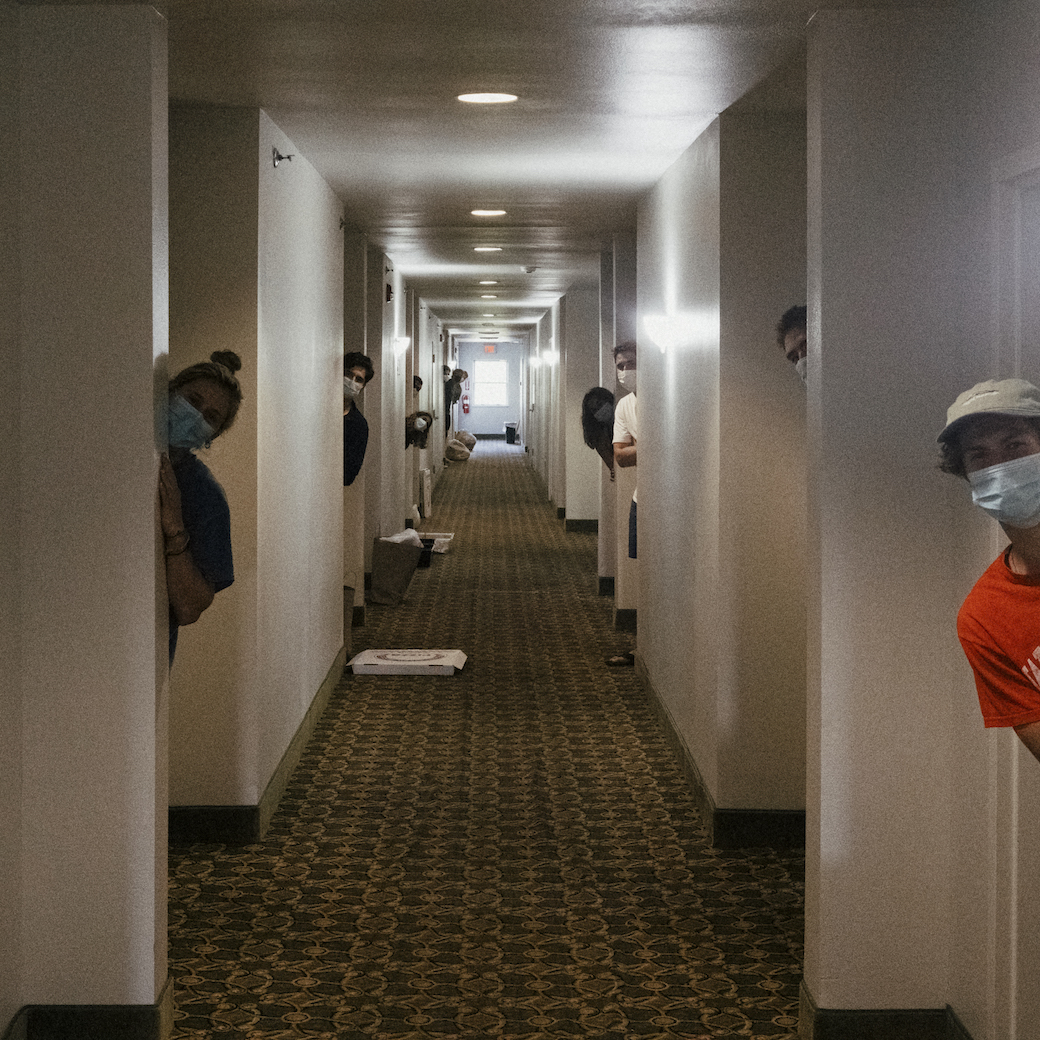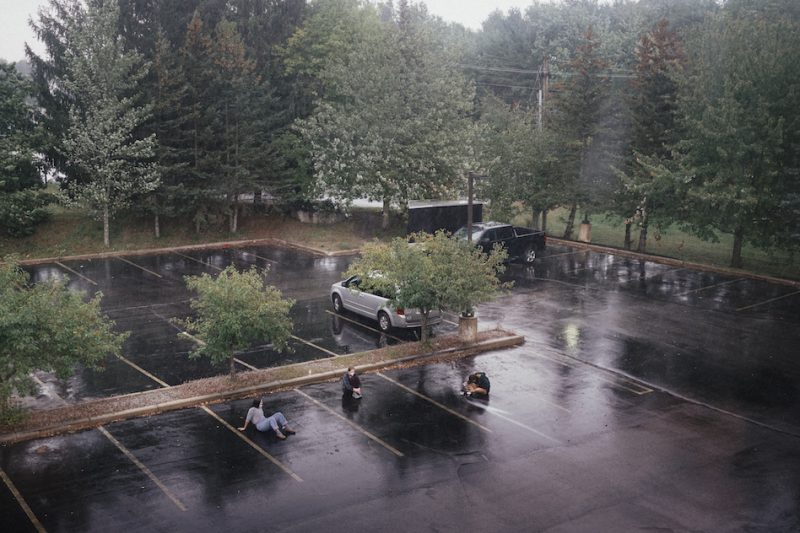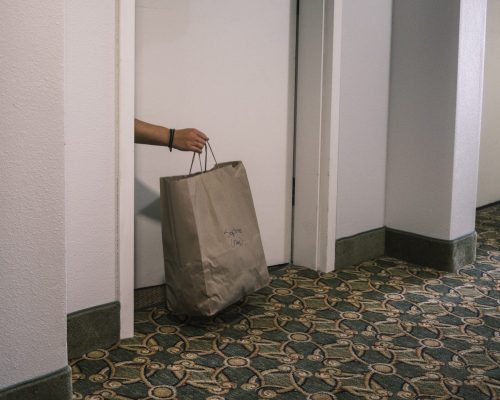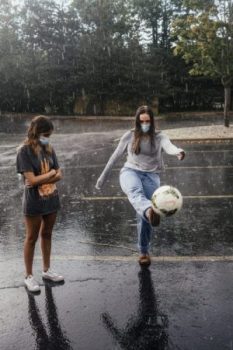Isolation protocol adapts to rising COVID-19 cases
September 10, 2021
 Cheng Xing
Cheng Xing“We are making this accommodation for students who can get home safely without endangering public health (i.e., driving, not flying), have access to a dedicated bedroom and bathroom in their homes and are sharing a roof with fully-vaccinated individuals ([while] we are discouraging students from isolating at home if they have any immunocompromised or unvaccinated family members),” Toro-Ferrari wrote in an email to the Orient.
As of Thursday evening, there are 12 students in the Freeport hotel and 18 isolating elsewhere. While students who chose to isolate elsewhere are in charge of their own transportation and food arrangements, those in Freeport were escorted to the hotel by The Office of Safety and Security and are provided with breakfast, lunch and dinner from Bowdoin Dining Services.
The College is following United States CDC guidelines, according to Toro-Ferrari.
“Students are isolated for ten days from symptom onset and a recent corroborating viral test,” Toro-Ferrari wrote. “If they have no symptoms, then they are isolated for ten days from the date of the test. If students still have symptoms after ten days or if there is a significant lag in days between the onset of symptoms and their confirmatory test, then an antigen test may be offered before the tenth day of isolation to help determine infectiousness.”
As a recurrence of illness is unlikely for several months due to COVID-19 antibodies, these students are not required to undergo the College’s testing protocol for 90 days after the last date of isolation.
Although cases have spiked in the past week, Associate Dean of Student Affairs and Director of Residential and Student Life Mike Ranen is not worried about running out of isolation space.
“In the last week we’ve secured some additional housing,” Ranen said. “Just in case the hotel in Freeport ever fills up, we have the empty Maine State Music Theater apartment buildings in the town of Brunswick that we’re able to use, which we’ve actually used before when we had to have overflow housing.”
Ranen emphasized that students who are not isolating in Freeport will still receive support from their deans and Health Services as needed.
“If they have somewhere else that may be more comfortable, they are more than welcome as long as they can safely get there,” Ranen said. “So if a student can say go home or go somewhere else to do their isolation, they can and we will still support them with check-ins and telehealth appointments.”
Blythe Peterson ’23, who is isolating at a friend’s house in Vermont, appreciated the calm and patient approach Health Services took when she and fellow students tested positive.
“Because we all tested positive first, we were all freaking out,” Peterson said. “But they put us in one room and told us what was happening and our options and gave us time to figure it out. It was never rushed and the nurses and the doctors were very supportive and kind.”
For the first several days in isolation, students both symptomatic and asymptomatic attended telehealth appointments with Health Services. For the remainder of isolation, they could opt to either continue the daily appointments or communicate with Health Services via text.
While some students had little to no COVID-19 symptoms, others such as Meredith Stetter ’23, who has asthma, reported experiencing intense feelings of sickness in their initial days of isolation.
“I was knocked down,” Stetter said. “I was coughing heavily, had tightness in my chest, a high fever of 102 degrees, coughing, sneezing, stuffy nose, headache, fatigue—the whole lot of it.”
Rachel Potoker ’23 not only felt fatigue and cold-like symptoms but also lost her sense of taste and smell.
“At first I was like, whatever it’s only your smell and your taste, but then shit gets to you—it’s not fun not being able to taste things,” Potoker said. “My favorite food is bread, but I don’t even like eating muffins anymore because the texture just isn’t there.”
Regardless of the presence of symptoms, students have had a challenging time remotely navigating in-person classes and handling the workload of a full course schedule.
“By the time the symptoms really hit me, I couldn’t do any schoolwork,” Stetter said.
Despite experiencing the majority of her symptoms in the first couple of days after testing positive, Peterson’s fatigue has been consistent throughout the duration of her isolation.
“Everyone feels tired at like 6:00 p.m.,” Peterson said. “I can’t really do work late at night, and I can’t even imagine trying to exercise. I think my chest would hurt too bad.”
On the other hand, George Rowe ’23, who is immunocompromised and asymptomatic, is isolating at home in Brookline, Massachusetts. He acknowledged the difficulties which professors face in facilitating a hybrid classroom for isolated students.
“Our professors don’t quite have the right tools from the College in order to send us a video of their class, or a live classroom,” Rowe said. “It’s one thing to do a Zoom where everyone is on Zoom, but it’s a whole other beast when you have 90 percent [or more] of the class there in-person.”
Juggling varying levels of resources and class structures, professors have full discretion in the way they choose to teach students in isolation.
“Every year there are people who have a family emergency where they need to leave for a week, have a concussion or are really sick and can’t go [into class] for a week,” Ranen said. “It’s not new that professors work with students with missing [longer] amounts of class, and I think each different professor has different methods around that.”
While some students plan to meet in person with professors after isolation, others are able to attend Zoom sessions during class or spectate from a camera in the back of the classroom.
Zach Ennis ’23, who isolated in Freeport and experienced mild fever-like symptoms, found ways to embrace remote learning and approach “Zooming in” with a sense of humor.
“I’m kind of just a face on a laptop or an iPad,” Ennis said. “I [could] still be part of my group in one of my classes, so they just [spun] me around and they pass me around to say ‘hi.’”
Some professors, on the other hand, have utilized recorded
lectures from the 2020-2021 academic year. Although this approach is helpful to professors whose class structure is less conducive to Zoom, Stetter pointed to the downside of students consequently having to spend more time on screens.
“My professors aren’t really [having me] Zoom into classes,” Stetter said. “I’m just watching old recorded lectures from last semester, which takes absolutely forever, so basically I spend all day staring at the computer screen with no social breaks or anything besides FaceTime, which is just more time looking at a screen.”
According to Toro-Ferrari, students isolating in Freeport were initially not allowed to leave their rooms or go outside, but after hearing student feedback the College worked with the hotel to allow students limited outdoor access every day.
“Thanks to some negotiation between Bowdoin and the hotel, students are now able to take thirty minutes of outdoor time every day—a small concession but something I know has a tremendous impact on reducing the difficulties of isolation,” Toro-Ferrari said.
To go outside, students must notify the front desk and are then escorted by a hotel employee through the backdoor to the parking lot.
“[Going outside] is actually kind of fun,” Stetter said. “We can all sit out there with our masks on in this little corner of the parking lot next to the highway.”
Living in Vermont at a friend’s house, Peterson is grateful to go outside as much as she pleases.
“I try to be outside because I am able to,” she said. “I brought my hammock here, so I try to sit in that and call my family, watch TV, or do school work.”
Gerardo Hernandez ’23, who tested positive along with
all of his roommates, has been isolating by himself in his Coles Tower suite and has not been outside once since beginning isolation. However, he has found ways to maintain a sense of human connection.
“Sometimes my friends stand outside and wave at me when I’m looking out the window,” Hernandez said. “At first, [isolation] was kind of depressing, but I started doing yoga, downloading games on my phone, and calling friends… I’ve been learning how to be comfortable with myself alone.”
Like Hernandez, the students in Freeport have found ways to cope with isolation by creating a group chat to communicate and commiserate. Whenever a new student enters the hotel, Ennis describes how the group chat becomes active and students rush to their doors.
“When new people are coming in, you can hear when they first get in the hallway,” Ennis said. “Then we wait and we listen and when we hear sounds we all run and look and yell to newcomers through our peep holes.”
Although students have found ways to stay positive, Ranen acknowledged that isolation is not ideal.
“We don’t want to pretend that isolation is fun,” Ranen said. “We’re trying to meet the needs that [students] have, in a way where they’re still being isolated because we need to stop the spread.”
Toro-Ferrari added that the College is still learning and working to create the most effective and livable ways to isolate students.
“We have learned a lot in the past ten days, and that knowledge builds on top of the nine months of experience we had in the trenches last year,” Toro-Ferrari said.
“I work with a team of dedicated and skilled individuals—from student affairs, to security, to dining and housekeeping—who are plugging away on nights and weekends to keep our campus and local communities safe and to care for our students in isolation. We know how to control the spread of COVID-19 on our campus, and I am confident we will get there even if this isn’t the start to the semester we had hoped for.”




Comments
Before submitting a comment, please review our comment policy. Some key points from the policy: